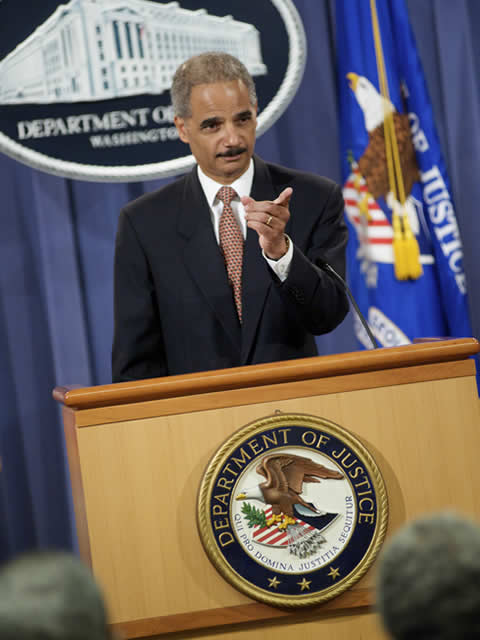The Obama administration’s Justice Department has taken the extraordinary step of subpoenaing a journalist in a leak case against a former CIA operative.
James Risen, a reporter for the New York Times was subpoenaed in the case against Jeffrey Sterling, who is awaiting trial for allegedly leaking classified information that Risen used in his book State of War. Justice Department policy requires that such request be approved by the attorney general, meaning that Eric Holder signed off on the filing.
In the 30-page document filed on behalf of U.S. Attorney for the Eastern District of Virginia Neil H. MacBride, DOJ Criminal Division chief Lanny A. Breuer and former Public Integrity Section Chief William M. Welch II amongst others, the federal government argues that Risen could testify about his previous relationship with Sterling without violating his alleged confidentiality agreement with the former CIA agent.
“Risen’s testimony can also establish venue for certain of the charged counts; can authenticate his book and lay the necessary foundation to admit the defendant’s statements in the book; and can identify the defendant as someone with whom he had a source relationship that pre-dated the charged disclosures,” the filing states.
“As we describe in the following pages, the Supreme Court has held that absent a showing that a criminal proceeding is being conducted in bad faith or for the purpose of harassment, there exists neither a First Amendment nor a common law reporter’s privilege that shields a reporter from his obligation to testify, even if the reporter’s testimony reveals confidential sources and information,” the government lawyers write.
“The question here, therefore, is not whether the testimony is probative of factual issues that will be before the jury, but whether there exists a reporter’s privilege – either under the First Amendment or common law – that exempts this eyewitness from being called, like any other citizen, to provide relevant facts under oath to the jury,” the government argues. “As described below, the answer is no.”
Another part of the filing cites subpoenas issued to reporters Judith Miller, Matthew Cooper* and Tim Russert during the investigation into I. Lewis “Scooter” Libby, Dick Cheney’s former chief of staff.
In the proceedings arising from the grand jury subpoenas issued to reporters Judith Miller, Matthew Cooper and Tim Russert, the United States District Court for the District of Columbia similarly addressed – and rejected – such a common law privilege. Specifically, the District Court held that “[i]n the absence of a grand jury acting in bad faith or with the sole purpose of harassment, Branzburg makes clear that neither the First Amendment nor common law protect reporters from their obligations shared by all citizens to testify before the grand jury when called to do so.” In Re: Special Counsel Investigation (Matthew Cooper and Tim Russert), 332 F. Supp. 2d 26, 28 (D.D.C. 2004). The District Court reiterated that holding just two months later by finding that “Ms. Miller has no privilege, based in the First Amendment or common law, qualified or otherwise, excusing her from testifying before the grand jury in this matter.” In Re: Special Counsel Investigation (Judith Miller), 338 F. Supp. 2d 16, 19 (D.D.C. 2004).
As exhibits, the government included two pages from Risen’s book and a copy of the New York Times story he wrote on Sterling. The filing says the government expects Risen to try to quash the subpoena. He told his colleague Charlie Savage that he’d do just that.
“I am going to fight this subpoena,” Risen said. “I will always protect my sources, and I think this is a fight about the First Amendment and the freedom of the press.”
The government’s motion is embedded below.
Ed. Note: Matthew Cooper is editor-at-large at TPM. This story has been updated.






